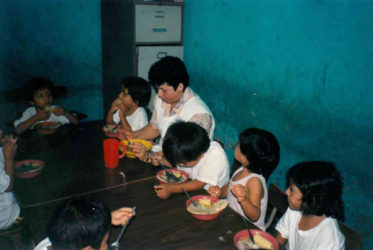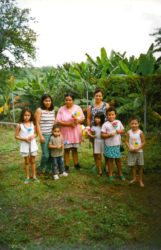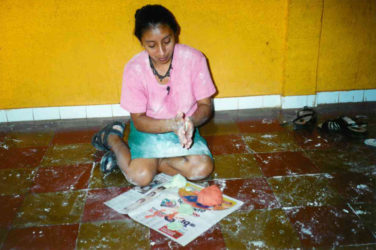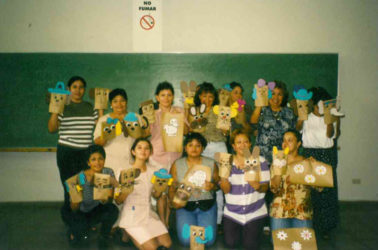Behind the scenes
From universities to state schools: the Bernard van Leer Foundation’s far-reaching impact on learning
Bernard van Leer Foundation Historical Cases
We commissioned narrative case studies of several countries in which we previously had a long-term presence. Though making the transition to scale was not then an explicit aim, we wanted to see what we could learn from these experiences to inform our scale-focused partnerships today.
FOREWORD
Two distinct stories emerged from El Salvador when we asked Jean Friedman-Rudovsky to look back on our involvement in the country between the late 1980s and phasing out in 2008. In this story you will read how, over those two decades, key employees at one partner organisation we funded rose to play a leading role in government – as insiders and advisers, they shaped national policy on early childhood, and university courses for training educators.
There was never a conscious intention on the Foundation’s part to identify and invest in people who could become leaders – but the fact that it happened by chance suggests it could happen by design. It is, however, no guarantee of success: despite the prominent roles played by individuals, our work in El Salvador cannot be said to have achieved meaningful scale, given that only 5% of families have access to quality preschools. In the process of translation from small-scale project to national-scale policies and programmes, much that was considered important was lost.
I am most grateful to Ms Alas for making the time to share her reminiscences, and to our programme officer at the time, Marc Mataheru, for his valuable guidance and recollections. My own learning questions after reading this piece are shared at the end.
Michael Feigelson, Executive Director, Bernard van Leer Foundation, August 2018
El Salvador
- Period:1992-2008
- Total Bernard van Leer Foundation investment in El Salvador: EUR 2,000,000 – EUR 111,000/year
In the late 1980s, representatives from the Bernard van Leer Foundation began a close relationship by supporting the project ‘Escuela de Padres’ (school for parents) of the Department of Social Protection at the Universidad Centroamericana José Simeón Cañas (UCA), in San Salvador. Run by Jesuits, the UCA was renowned for its progressive leadership and was eager to get more directly involved in the flourishing movement to promote children’s interests, and in teaching about themes related to early childhood in El Salvador. Starting in 1992, the Foundation supported a project that facilitated and amplified the influence of projects about early childhood care and attention that were being realised by the organisation CINDE and other child development centres spread across the country. These centres were connected to each other through the Red Arcoiris (the Rainbow Network) and the Red por la Infancia y la Adolescencia (RIA) (Network for Childhood and Youth), whose proposal was to advocate for integrated early childhood services and training courses in themes related to early childhood in El Salvador.
In the UCA project initially known as the Escuela para Padres, the first aim of the programme was to provide the families who made use of the non-governmental childcare centres with the knowledge and tools for the care and development of their children, based on a human rights perspective. On their own, centres like CINDE, Centro Hogar Alfonso Acevedo and Guarderías 22 de Abril were holding training sessions and conversation groups with parents (both fathers and mothers) on a range of topics such as corporal punishment, nutrition and hygiene. However, UCA leaders had learned that educators felt they needed help to find the most beneficial way to speak to parents on these topics.
Towards the end of the civil war the UCA was involved in coordinating networks of educadores populares (community teachers). Its Department of Education took on the challenge of designing and constructing a curriculum based on the work it had already been doing with families since 1990 through childcare centres and preschools, the aim being to validate the work of these community teachers in the context of the negotiations with the Ministry of Education, and bring them into the formal system. The goal, says Sandra Alas, who was involved in the UCA project and is now El Salvador’s Ambassador to Italy, was to ‘encourage an entire model which will incorporate the family, not just the teachers, in having a formative role in the child’s development.’
Towards the end of the civil war the Department of Education was involved in coordinating networks of educadores populares (community teachers) with the aim to validate their work and bring them into the formal system.
That turned out to be just the beginning. As the 1990s progressed and El Salvador came closer to officially ending the civil war, UCA’s Department of Education expanded this curriculum. With the help of the Bernard van Leer Foundation, both financially and through pedagogical guidance, those running the Escuela para Padres programme realised that they had an opportunity to play a much more important role than just facilitating parent education.
That’s how the team designed a curriculum for a training course, the Diplomado en Educacion Infantil (Diploma in Child Education) for the community teachers. This two-year course combined guidance by the team in the childcare centres with all the training modules necessary for the community teachers not only to improve their practice, but also to commit to preparing activities and important educational materials that were meaningful and appropriate to the context in which children lived and grew up. These teachers, mainly women who had never had the opportunity to receive much formal schooling, were passionate about the programme and – assisted by a network of early childhood learning advocates – they presented a proposal to the Ministry of Education that a clause should be included in the Education Reform Act (part of the Peace Agreement of 1992) stipulating that women who had completed the UCA training programme would receive a certificate that gave them the accreditation to work as preschool teachers in the formal system. Unfortunately, this was not accepted by the Ministry at the time.
The goal was to encourage an entire model which will incorporate the family, not just the teachers, in having a formative role in the child’s development. – Sandra Alas
Ambassador Alas, who had been a member of the UCA team since 1995 and coordinated the programme from 1999 to 2001, contributed to designing the new official curriculum of the Teacher Training Course in Early Childhood Education. She recalls that time with fondness, affirming that the Bernard van Leer Foundation was a great support in structuring what became a three-year formal teacher training programme – to which the Foundation contributed its experience from relationships with partners in Latin America and throughout the world – offering a wealth of knowledge on best practices. ‘It was a great personal honour to be part of this process,’ Alas told me via video conference from her desk in Rome. ‘This permitted an amplification of the existing knowledge as well as a validation of the important role that these women played before and after the war.’ She said that the government at that time proved it was not, in many ways, a true ally of community education programmes, but that this curriculum and the certificate that was awarded to the community teachers was one of the ‘most important and long-lasting successes of the processes that the Bernard van Leer Foundation supported within the UCA.’
Alas and others realised that the name Escuela de Padres fell short of representing the broader vision that the programme had come to embody: ‘by that time, it wasn’t just about teaching mothers and fathers, but about a full curriculum, including participatory research, for community teachers.’ So, they themselves renamed the programme the ‘Programa de Atención y Educación Inicial’ (Programme for Early Childhood Care and Education), or PAEI. The programme became more than a learning space for the teachers: they also generated new and innovative ideas about what should happen in the classrooms – Alas recalls many important examples: the use of inexpensive materials, and different methodologies for learning at these stages of a child’s life.
The role of the Bernard van Leer Foundation, Alas said, continued to be central to PAEI’s work. ‘Not only did they help with the development of the curriculum and design of the materials, they also provided support in the research and systemisation of knowledge, and in publicising the results of our work at conferences and annual meetings,’ she said. ‘Our relationship with the Bernard van Leer Foundation was always a space where we could reflect and think strategically about where we were going, and what we could do to enlarge and enrich the experiences of those childcare centres that had abandoned the concept of the guardería (a place where parents drop off their children) in order to evolve towards practising a more holistic educational approach.’ Of equal importance, she added, were the relationships that the Foundation formed with PAEI staff and with others working internationally in the same field – particularly colleagues in Mexico, Venezuela and Spain – which resulted in their providing invaluable pedagogical support.
Valuable as it was, PAEI itself did not last long: by 2001, for internal reasons, the university decided to close the programme. The work, however, did not end. At about the same time, part of the PAEI team introduced the specialist Teacher Training Course in Early Childhood Education into the formal programmes of UCA’s Department of Education. Through this new route, elements of the PAEI were incorporated in the formal programmes, including its basic principles which were absorbed into a new university degree. ‘We transferred many of the basic training principles of PAEI – the pedagogical, psychological and social focus, for example – into the new university track,” she said. ‘Perhaps [the new specialty] didn’t have the same spirit as PAEI but we were able to influence what was developed by the university.’ The UCA proved deeply loyal to this programme, continually hiring more staff and growing the scope of this specialty and its courses. Within a few years, a student at UCA could study for a bachelor or masters degree and even a doctorate in early childhood education.
We transferred many of the basic training principles of the Programme for Early Childhood Care and Education – the pedagogical, psychological and social focus, for example – into the new university track."
By the end of the 2000s, Alas ended her 15-year career as lecturer and researcher in early childhood education at the UCA to become Director General of the Ministry of Education – and that led to another development that was a legacy of the investment made by the Bernard van Leer Foundation in programmes with the UCA. In 2012, the Ministry of Education decided it wanted to rewrite its national curriculum, both for the training of primary school teachers and the training of teachers at preschool level, which would have nationwide impact. Government officials called on the UCA for assistance for the educational programmes for children from birth to 6 years old, as they were now considered experts. The UCA team proposed that the government should establish a national curriculum for all children, starting from pregnancy – a tremendous achievement given the fact that previous governments (before that of the Frente Farabundo Martí para la Liberación Nacional (FMLN)) had considered that the state’s role in education only started at the age of four.
Blanca Rosa Vásquez is the current Director of the Teacher Training Course in Early Childhood Education at UCA, and was a member of Alas’s team during the period when it was receiving support from the Bernard van Leer Foundation. She says that the national curriculum includes all the areas that were emphasised in conversations with the Foundation regarding the methods that teachers should to use every day in the classroom. ‘Holistic development, getting mothers and fathers involved, active participatory education, everything we developed was ready to be taken up by the national curriculum,’ she said.
The current national curriculum includes all the areas that were emphasised in conversations with the Foundation regarding the methods that teachers should to use every day in the classroom. – Blanca Rosa Vásquez
It is a great achievement, says Alas, that the FMLN government did commit to early childhood education and through the Ministry of Education has officially recognised the under-3 age group as of great importance in the formal education system and in public policy. The big challenge in provision for children from birth to 6 years old is to ensure a considerable increase in the budget, in the administrative plans both at municipal level and at the national level, to increase the national coverage of services. In practical terms, the country has still poor coverage: only 6–8% of children aged up to 3 years have access to early care and education, although it is relevant to note that the model that is being implemented is directly linked to community networks and local government. Those who are receiving the service are benefiting from the models developed by the Bernard van Leer Foundation in the 1990s. In relation to this, Alas mentions that the PAEI programme does not focus solely on children up to 3 years old, it extends to children aged 3–6. In terms of coverage, this increased significantly in 2017 for children aged 6, to 84.4%; for 5 year olds it was 71.5% and for 4 year olds it was 41.9%.
The UCA model for training educators has also had an indirect impact through its close relationship with the Ministry of Education in recent years: the curriculum for bachelors and masters degrees and doctorates in preschool education has been extended to 16 universities throughout El Salvador. Other senior officials in the Ministry of Education besides Alas have come through the ranks of the UCA programme or have been trained by UCA staff, meaning that the relationship with UCA has resulted in the opposite of a brain drain – a skills transfer.
Vásquez says that the influence of the Bernard van Leer Foundation can be seen in almost every corner of early education: ‘the fruits of their work are present daily’. Many of the women who started as untrained community teachers have received certificates, and many have gone on to finish undergraduate and sometimes graduate degrees. ‘There is also now a national policy on early childhood – an acceptance that those aged between 0 and 3 deserve education and, in essence, that comes from the Bernard van Leer Foundation and the Escuela para Padres.’ She says that the main elements of the Foundation’s approach – an emphasis on rights, teacher training, and a commitment to holistic development, not just learning by rote – still live on: ‘that’s from the effort made, and supported by the Foundation, in the 1990s’.
Learning Questions
We commissioned these historical studies in part to identify questions we should ask ourselves as we plan future work. Learning questions raised for us by this story include:
- How can foundations identify emerging and current leaders and find ways to invest in their career trajectories and future prospects? Is this a good strategy for foundations to follow instead of or alongside investments in institutions and discrete projects?
- This story highlights the importance of accreditation for training – a common issue in the field of early childhood development. Is a focus on this within the comparative advantage of private foundations?
- When trying to get other (public) institutions to adopt an idea – such as a methodology, curriculum or service model – does having a strong brand help or hurt chances for success? Depending on your answer, what does that mean for foundation funding policies?
Copyright © Bernard van Leer Foundation. All rights reserved.






